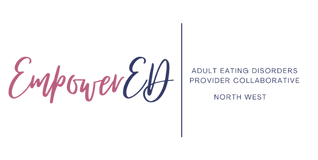How it feels to have an eating disorder
When the thoughts appear, you may not notice, it doesn’t seem a problem. ‘What’s the harm in skipping a few meals?’ It seems the right thing to do, you feel out of control within your life, but this illness gives you that sense of control that you crave. It starts with a friendly voice that seems easy to befriend, it seems like the only one who understands and cares about you.
As things progress, malnutrition kicks in and your thought processes become so irrational that you ignore people around you as no one will understand you like the eating disorder. It becomes the only thing you care about and nothing else matters. It gets out of hand very fast, and you start to lose control of everything as the only thing controlling you is the eating disorder.
Your friends and family and support systems become the enemy. It becomes very lonely, very fast. It feels like no one understands how hard it is to pull this back, ‘it's only food, it can’t hurt you’, they don’t understand how much you love food, but the voice won’t allow you to eat what people are telling you to. It becomes an addiction, seeing the number on the scales go down brings the only sense of achievement and nothing else matters. You lose everything; school, friends, trust, and mental health.
It becomes impossible to trust anything but the voice in your head and seeing people become so frustrated with you causes self loathe. It’s hard to think straight and you don’t care about the consequences. You can’t see a future without the eating disorder. After losing all your teenage years and early twenties, everything you used to love doesn’t matter anymore.
Comorbidity and the importance of teams working together
Eating Disorders rarely appear alone. It can be a symptom of another mental health disorder. It is common for those diagnosed with ASD, EUPD or OCD for example, to also have an Eating Disorder, but individuals are very rarely treated as a whole and instead, services focus on one disorder at a time. Individuals can be passed from service to service depending on which is the presenting problem at that time or refused help because one condition is destabilised. As one condition gets better, another can rapidly decline, this is when the patient can be passed to another service, but this cycle can be never-ending and counterproductive. Eating Disorders give those with other conditions control when they feel they have no control over their other conditions. Individuals should be assessed as a whole and try to establish how to best support them in all areas as they are all linked and affect one another.
All services should be aware of Eating Disorder guidelines so individuals do not receive conflicting advice e.g. mental health team saying at least you have had one meal a day when told previously they should have ‘3 meals 3 snacks’. All services need to work together and communicate so everyone is on the same page. There needs to be a focus on where the ED comes from and whether it is a symptom of another disorder or whether other disorders are a result of malnutrition and the ED.
There are no positive thoughts anymore, you don’t see a future, but you don’t care as long as the eating disorder is happy. People don’t understand how debilitating this illness is and how much it takes away, it can be hard for people to see why you would want to carry on this way of life when there was once a positive future for them. But this illness is blinding, it is manipulative.
